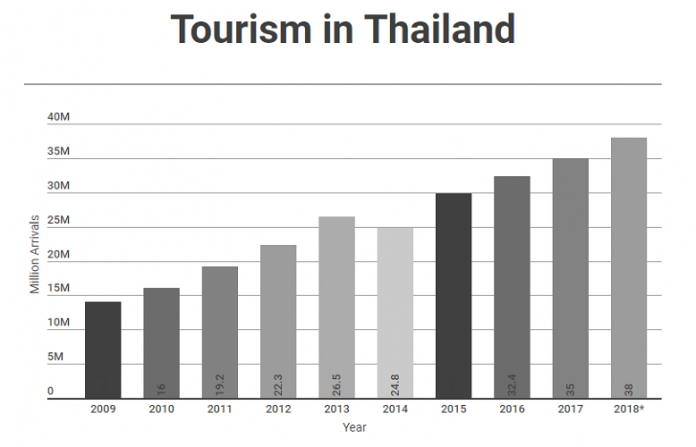In an announcement made by the Public Health Minister, Piyasakol Sakolsatayadorn, Thailand has made a big move up in the Bloomberg Health Care Efficiency Index. The Kingdom jumped from 41st position to 27th position in just the last year. The index covers 56 countries. This jump was the largest move of its kind recorded during the latest survey period.
The index measures the health of workers and the efficiency of workplaces taking into account days off and health spend. According to the index, the health spend per capita in Thailand came in at 7,086 baht, or US$218. Life expectancy has risen to 75.1 years.
Thailand came in 9th in Asia with Hong Kong, South Korea, Australia, Taiwan, Japan, China, New Zealand, and Singapore making up the other positions in the region.
Hong Kong claimed the top spot in the overall index with an average lifespan of 84.3 years, whilst Singapore claimed second place. Third and forth places were claimed by Spain and Italy respectively.
The criteria for being in the index was to satisfy three conditions. First was to have an average life expectancy of 70 years, second was to have a per capita GDP of at least 5,000 USD and third was to have a population of at least 5 million people.
The Prime minister was very satisfied with the Thailand’s Leap in the index. National health security was being actively promoted in Thai society, and is important since it raises living standards for all of the people in the country.
At the same time the World Health Organizationheld up Thailand as a good model for other countries to follow.
Thailand is also well known for its medical tourism, being hailed by many medical tourists as an efficient, cost effective and technologically advanced center of excellence for all sorts of medically related requirements.
These benefits are also available to the Thai population under public healthcare provisions.
Thailand has in place excellent training for doctors and nurses and has branched out into advanced training for different specialists so that support can be given for many types of distinct medial issues.
Other factors such as environmental pollution of the air and water supply, transport safety and the quality of food in the food chain all help to increase life expectancy and at the same time have an effect on the healthcare system.
For example air pollution can lead to respiratory conditions and also may be a factor in the cause of cancer. By maintaining a positive environmental agenda, benefits can easily be seen in the healthcare statistics.
Lifestyle changes are also being encouraged. With fewer people smoking and with the promotion of regular aerobic exercise, healthy diet considerations, and reduction of stress, life expectancies are expected to continue to climb, not just in Thailand but also worldwide.










